"The only thing I hate," says Zatoichi the blind swordsman in the very first television episode of Zatoichi monogatari, "is killing people." Sad for Ichi, he always has to do the one thing he most hates.
In Tales of Zatoichi: A Challenge of Chance (1974), Ichi wanders into a small mining town where a family that has for generations been labor bosses of the copper miners is displaced by a cruel boss, Yamagen, who has bought off a corrupt government official.
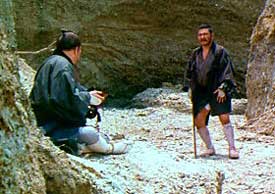 The television versions of Zatoichi's adventures were produced by the star of the long-running film series, Shintaro Katsu. The production values were top of the line & each episode is more like a 44-minute mini-movie than the usual episodic tv. The television versions of Zatoichi's adventures were produced by the star of the long-running film series, Shintaro Katsu. The production values were top of the line & each episode is more like a 44-minute mini-movie than the usual episodic tv.
Many of the crew were from the film series, including duel choreographer Eiichi Kusumoto & cinematographer Fujio Morita who insured a feeling of continuity from the films to the tv-series, & director Kimiyoshi Yasuda who had directed Zatoichi & the Fugitives, Zatoich vs the One-armed Swordsman, & others, as well as episodes of the Kyoshiro Nemuri "Full Moon Swordsman" series, oversaw the entire first season while individual episodes had specific directors who also worked on the series. Indeed, the first episode A Challenge of Chance was directed by Kazuo, who directed the second feature film about Zatoichi, in 1962, & further episodes through the years.
Using the original films' directors insured a sense of continuity. About the only difference in look & tone was films had been widescreen & the tv show was not.
Strong storytelling with emotional content as well as the amazing "blind swordsman action" is the other essential ingredient for excellence. Perhaps it is true that the "wandering into yet another village & killing all the bad guys" got redundant, but there was nearly always something extra to each of scriptwriter Ichiro Ikeda's scripts, with just enough complexity that each tale might've worked even as a written short story.
Ichi befriends Oshin the young woman attempting to keep her family's labor-boss business in existence after the death of her father. Yamagen gives her company a token number of jobs for her to divvy between a few of her workers, but this was only a trick to get them injured or killed. An old friend of her parents, Tatsuzo the Sword-thrower, had in youth been a rival for Oshin's mother's hand in marriage, so he feels fatherly toward Oshin.
Between Tatsuzo & Ichi, the final confrontation to wipe out all the bad guys makes for impressive action. A rifle assassin who was pretty sure he'd successfully killed Ichi before the final conflict left evil Yamagen pretty darned surprised when Ichi showed up to inform him, "I went down to hell, but Emma sent me back to send you before him." Emma is the Japanese king of hell.
Tales of Zatoichi 2: That Flower that Bloomed with the Lullaby was directed by YoshiyukI Kuroda who also worked on the "Kozure Okami" Lone Wolf with Child series.
It begins with Ichi helping a kid pick persimmons, then getting stuck in the tree when the rightful owner of the tree & its fruit happens by. The old gent doesn't mind that Taro steals the fruit because he knows the lad sells the persimmons to get money for his grandfather's medicine.
Years before, when his mother first got pregnant, a wealthy merchant kicked her out of his life taking no responsibility for the child. She lived a hard life as a prostitute & died young. Now that the grandfather is also dying, the child will be completely orphaned.
Following a plotline familiar from the feature film Zatoichi Challenged (1967), the grandfather practically on his last breath charges Ichi with protecting the boy & getting him safely to his father, who had already begun to look for the child for want of an heir. Soon bad gangsters realize there's a reward for finding the wealthy merchant's heir, so Ichi has to protect Taro from kidnappers who would ransom him.
Oshino a prostitute & Inosuke a gambler want to flee their lives in the town & make a life together, but Inosuke never follows up on their dream. This time he decides they have to get the reward for the boy before they can start life anew. How Ichi protects Taro from seriously dangerous yakuza, & how he inspires Oshino & Inosuke to at long last pursue their dream together instead of living in the criminal world, is the meat of this touching story.
Ichi's very last action in behalf of the mischief-causing couple is a heroic act of goodness & forgiveness, as they've been betraying nuisances during the whole episode, yet Ichi sees the potential good in them even so. And people do often live up to expectations, good or bad.
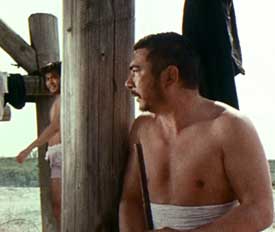 Those first two mini-movie television episodes were beautifully filmed & acted, but also very predictable without the least wavering from the usual Zatoichi plots already familiar from twenty-five feature films. To not stretch the story types may have been a commercial decision while re-establishing the character for a television audience. But for Tales of Zatoichi 3: Memorial Day & the Bell of Life, Shintaro Katsu personally directed the episode, & the script strove for something a little different. Those first two mini-movie television episodes were beautifully filmed & acted, but also very predictable without the least wavering from the usual Zatoichi plots already familiar from twenty-five feature films. To not stretch the story types may have been a commercial decision while re-establishing the character for a television audience. But for Tales of Zatoichi 3: Memorial Day & the Bell of Life, Shintaro Katsu personally directed the episode, & the script strove for something a little different.
Ichi has put up in the house of the widow of an oyabun (gambling godfather). Her husband died a year earlier, probably killed by the cruel young gang boss who is taking over local territories. The old woman is clinging to her husband's territory hoping her son will be able to continue in his father's footsteps, though the young man does not have any liking for the gambling world.
Ichi likes the old woman because her smell reminds him of his own mother, who died when he was very young. It is the morning of the anniversary of his mother's death, & on this day each year he has sworn an oath not to draw his sword from six in the morning (when she died) to six in the evening, dawn & dusk being marked by temple bells.
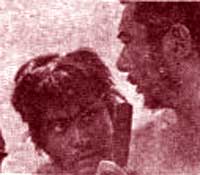 There comes a knock at the door & it's the thing the old widow has feared for a while. A gambler calls to her apologetically, saying that he & his companions have no grudge against her family, but that they had received a meal & a night's lodging, & by the rules of the yakuza world they must obey the oyabun who favored them. There comes a knock at the door & it's the thing the old widow has feared for a while. A gambler calls to her apologetically, saying that he & his companions have no grudge against her family, but that they had received a meal & a night's lodging, & by the rules of the yakuza world they must obey the oyabun who favored them.
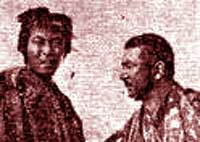 The old woman grabs a sword & leaps into action while her son cowers. She is met at the door by a poor ronin & two yakuza wanderers, & she is instantly cut down before Zatoichi can reach the door. In two strokes he kills the ronin & one of the wanderers, but the other wanderer slips & falls just as the morning temple bell strikes. Ichi holds his bared canesword at the young man's throat, but says, "It's your lucky day. I won't kill you." The old woman grabs a sword & leaps into action while her son cowers. She is met at the door by a poor ronin & two yakuza wanderers, & she is instantly cut down before Zatoichi can reach the door. In two strokes he kills the ronin & one of the wanderers, but the other wanderer slips & falls just as the morning temple bell strikes. Ichi holds his bared canesword at the young man's throat, but says, "It's your lucky day. I won't kill you."
The spared wanderer (Kinya Kitaoji, who also starred as Itto Ogami in the 2002 television series version of Lone Wolf & Cub as well as a couple feature film episodes of the yakuza series Battles Without Honor & Humanity) follows Ichi about for the rest of the day, proving himself more or less chivalrous by nature, but admitting he can be either good or bad according to situation.
Ichi as is often the case ends up assisting a young woman. By his romantic nature even gets her together with the recently slain widow's son, as both have lost their parents & neither wish to be involved in the yakuza world.
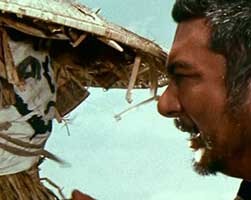 This episode is greatly about repurcussions, for the ronin he killed just before the bell rang that morning was the father of the distressed young woman. This episode is greatly about repurcussions, for the ronin he killed just before the bell rang that morning was the father of the distressed young woman.
It may be that Ichi acted in good conscience against a man who attacked an old woman, but he may well have ruined other lives by so easily cutting down anyone & everyone he hastily assigns to the category of "bad" & therefore justifiably kills.
Ichi spends the entire day honoring his oath to his mother's spirit, trying to evade murderous swordfights through hours that get increasingly dangerous for himself or others. When at dusk the temple bells releases him from his oath, he is once more attacked, & once more kills -- again with repurcussions, this for Ichi's own emotional state.
So many of the films & episodes about Zatoichi make the basic assumption that bad people can be killed en masse to restore a just order. Memorial Day & the Bell of Life asks whether or not killing wrongdoers can ever occur without the tragedy of death touching even the innocent.
copyright © by Paghat the Ratgirl
|
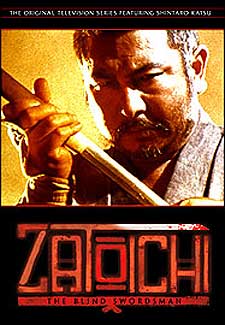
 The television versions of Zatoichi's adventures were produced by the star of the long-running film series, Shintaro Katsu. The production values were top of the line & each episode is more like a 44-minute mini-movie than the usual episodic tv.
The television versions of Zatoichi's adventures were produced by the star of the long-running film series, Shintaro Katsu. The production values were top of the line & each episode is more like a 44-minute mini-movie than the usual episodic tv.
 There comes a knock at the door & it's the thing the old widow has feared for a while. A gambler calls to her apologetically, saying that he & his companions have no grudge against her family, but that they had received a meal & a night's lodging, & by the rules of the yakuza world they must obey the oyabun who favored them.
There comes a knock at the door & it's the thing the old widow has feared for a while. A gambler calls to her apologetically, saying that he & his companions have no grudge against her family, but that they had received a meal & a night's lodging, & by the rules of the yakuza world they must obey the oyabun who favored them. The old woman grabs a sword & leaps into action while her son cowers. She is met at the door by a poor ronin & two yakuza wanderers, & she is instantly cut down before Zatoichi can reach the door. In two strokes he kills the ronin & one of the wanderers, but the other wanderer slips & falls just as the morning temple bell strikes. Ichi holds his bared canesword at the young man's throat, but says, "It's your lucky day. I won't kill you."
The old woman grabs a sword & leaps into action while her son cowers. She is met at the door by a poor ronin & two yakuza wanderers, & she is instantly cut down before Zatoichi can reach the door. In two strokes he kills the ronin & one of the wanderers, but the other wanderer slips & falls just as the morning temple bell strikes. Ichi holds his bared canesword at the young man's throat, but says, "It's your lucky day. I won't kill you." This episode is greatly about repurcussions, for the ronin he killed just before the bell rang that morning was the father of the distressed young woman.
This episode is greatly about repurcussions, for the ronin he killed just before the bell rang that morning was the father of the distressed young woman.